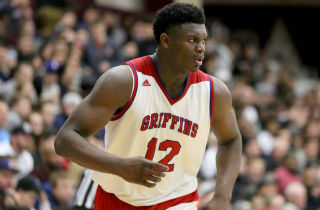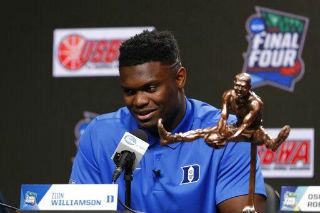It has been widely reported that the NBA will bring back the prep to pros rule that was in place from 1995 to 2006. It is expected to be re-installed for the 2021 NBA draft.
So here’s the thing: I should preface the following with the understanding that any forthcoming argument is truthfully somewhat biased by the fact that I believe implicitly in the right of anyone of the age of 18 or older to have the ability to enter their respective workforce and earn a living. And while I believe fully that regulation in its truest from is the cage that keeps the capitalistic animals from ravaging the greener pastures, I don’t believe regulation should impugn upon the ability of the individual to be able to at least graze upon that which should be available. With that being said, the current rules for NBA draft eligibility are exactly the type of overarching regulations that benefit only those making the money, and not those trying to. For anyone unaware, the league mandates that a player must be at least 19 years old during the calendar year of the draft and any player who is not an “international player” must be at least one year removed from the graduation of his high school class. Now while those are the rules, the reality behind why they are the rules is a bit more fraught.

Now, without argument, playing basketball professionally and it’s gains come with a veritable cornucopia of distractions that aren’t quite as omnipresent at a college campus. But aside from mandatory team functions, those distractions come with a level of autonomous choice that schoolwork theoretically does not.
In terms of the actual coaching the players receive and what that looks like for player maturation, college coaching in general is very structured and players learn system basketball. This is great for the development of guys who intend to be in that system, but the one-and-done guys won’t be there the following year. They won’t be consumed by the nuisance of Coach K’s scheme, or Boeheim’s zones, and at the next level rather than being shoe-horned into an enduring style, these players have the opportunity to hone in on their deficiencies and do so with a freedom that college programs by nature don’t allow for. That’s not to say that great college coaches don’t know how to adapt their system to their players, but no matter what, it’s still the program that ultimately is the focus and not the player. That paradigm shifts at the professional level, allowing for guys to become more complete players as they focus on what makes them special and what doesn’t.
Then there’s the notion that college provides players an opportunity to mature and grow emotionally and intellectually, which is an altruistic assumption at best. Carmelo Anthony stayed a year in college, was lauded for his leadership and maturity as a freshman leading his Syracuse Orangemen to a national title, and then those plaudits were never bestowed upon him again as a pro. Did he somehow devolve? Or perhaps he was never quite as mature as we wanted to make out, rather he was just a great player who was playing against comparably subpar talent. And in truth, we as spectators love to make it about something more than just physical ability when a guy does it in college. Contrast that with the number of guys in the league who were one-and-done and matured well after their one year in college (De’Angelo Russell immediately pops to mind), and the wealth of guys that just flat out never mature (I will refrain from listing those guys, but they’re not hard to find) and it’s a mixed bag, at best, in terms of what the college experience provides relative to maturing.
While some players undoubtedly grow-up while in college, you’d be hard-pressed to prove that time around veteran NBA players, guys who have been there and done that, isn’t as helpful, if not more so, to developing the maturity of a young player. Do we really think that the forced time at LSU helped make Ben Simmons a more mature young man or player? How about Michael Beasley? Or John Wall? The reality is that maturity doesn’t come in ages, it comes with experience. And while the draft history is riddled with tales of players who got too much too soon and couldn’t handle it, are we really acting as though that one year difference is the maturational fulcrum point for rich young men?
Add all this to that the fact that college basketball is a Petri dish of scandal and outright exploitation, and that most NBA level talents are being exposed to the seedy underbelly of college programs, shoes deals, and agents, before they ever enter the cesspool that is the NCAA. And the arguments for a player staying in school for maturation purposes seems to be far more motivated by the financial benefits of those involved than the development of the player himself.
The leading draft prospect factory going is Kentucky, a program lead by a coach who has vacated Final Four appearances at both of his prior two stops because of violations, and who blatantly has no regard for the notion of raising young men to be scholastic stars (Calipari is just one of many in this mold, but his program is the standard bearer). Do you really feel that Kentucky and the wealth of comparably run programs are really working to turn out mature young men? Or working to get young men who turnout fans? And truthfully, that’s fine. Kentucky and other programs aren’t doing anything wrong based on the current structure (I mean let’s be honest, they are all doing something wrong, but many aren’t being caught) but you can’t convince me that in any way it’s benefitting these players and their development. It benefits the programs and ultimately the NCAA.
Then there are those that venerate the high school- to-pro structure with talk of what happens to the young men who aren’t ready, the tales of unfulfilled potential the likes of Korleone Young and Leon Smith. And while those players surely weren’t ready for the big stage and flamed-out before they could conjure an ember (Young only played 3 games and Smith 15), these stories are actually far less common with high school prospects compared to college draft picks. Perhaps because of the relative rarity of teams rating a high school product as being of NBA caliber, or perhaps because teams will try longer to develop a younger player, but the reality is that of the 39 high school players to be drafted straight to the NBA since ’95, only 6 of those players played less than five seasons in the league– the aforementioned Young, and Smith, Ousmane Cisse, Ndudi Ebi, James Lang, and Robert Swift. Of those players, only Swift was taken higher than the 25th pick (Seattle selected him 12th in ’04) and his career was cut short due to an unfortunate battle with substance abuse, rather than a lack of physical ability. That means that 85% of the players drafted from high school had longer careers than the NBA average of 4.6 seasons. And those that didn’t, were taken with picks in a range that often don’t pan out anyways. Not to mention that those on the list that did go on to have successful careers is a veritable “Who’s Who” of Hall of Famers and All-Star level players. And while it’s safe to assume that, barring significant injury, any of these players would have been just as great had they played a year or more in college. What we don’t know is how many years of NBA productivity would have been lost had they still needed the requisite time to acclimate to the league following whatever time their collegiate stint may be.

In truth, it’s a bad look for college basketball right now watching kids enroll just long enough to play their freshman season and then dropping out of school to head to the NBA (not to mention a bad look for both the NCAA and the NBA when players play professionally somewhere else for a year to avoid college restrictions). Are collegiate sports really supposed to be a weigh station for players before they pass the border to professionalism? Not only does this take a potential scholarship away from a collegiate athlete who may even be nominally interested in academia, but it runs against the grain for colleges considering that the primary operative is still supposed to be a thinly veiled façade of academic endeavors.
Now I have no allusion that changing the rule will clean-up college basketball, nor do I think that the NBA product is necessarily better for watching players struggle to find their depth at the same time they struggle to finish puberty. But what it will do is at least allow the game to rid itself of the murky lies and contradictions that govern its current arguments for the preponderance of the existing unjust status quo. Young players who wish to enter their hat in the ring should be allowed to do so, and do so at their own peril. Then NCAA can focus the specious paternalistic impulses in some other direction. And everyone can eat.
